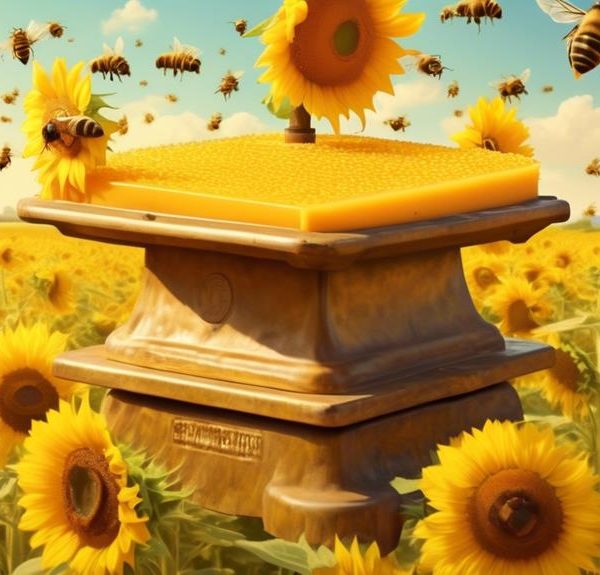Savor the intriguing tale of New Zealand's native bees, their unique bond with the Manuka bush, and the exquisite Manuka honey they produce.
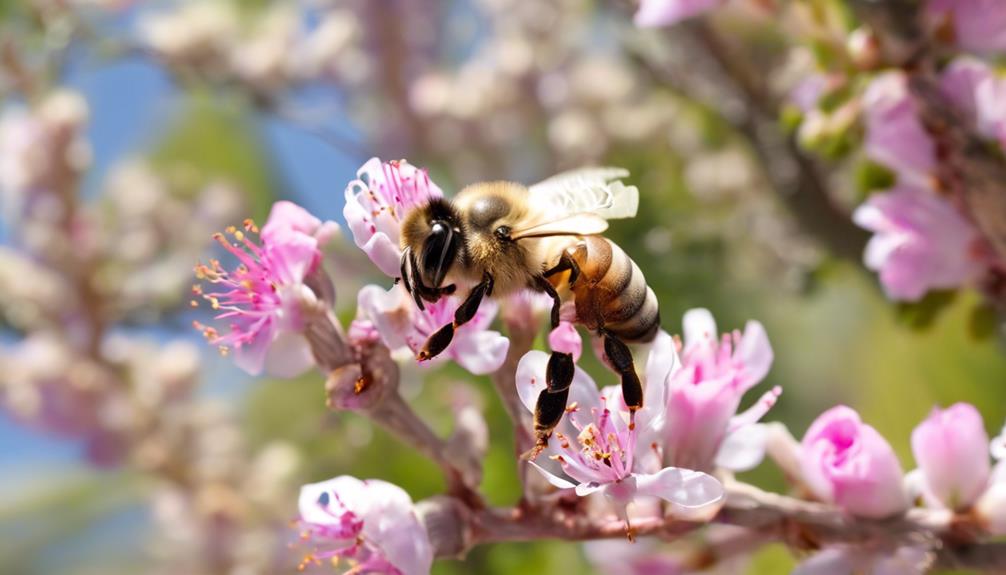
What Bees Produce Manuka Honey?
Imagine you're strolling through a supermarket aisle and you come across a jar of Manuka honey. You've heard about its unique health benefits and its distinct rich flavor, but do you know what makes this honey so special?
It's not just any ordinary bees that produce this liquid gold. Manuka honey is exclusively made by bees that feed on the nectar of New Zealand's native Manuka bush. Now, isn't that intriguing?
Why only these bees? And why only this bush? There's a fascinating story behind this, and you're about to uncover it.
Key Takeaways
- Manuka honey is produced by bees that pollinate the flowers of the Manuka bush.
- It contains Methylglyoxal (MGO), which gives it unique antibacterial properties.
- The Unique Manuka Factor (UMF) measures the strength of the antibacterial activity in Manuka honey.
- The Apis mellifera bee species is responsible for collecting nectar from the Manuka tree and producing Manuka honey.
Understanding Manuka Honey
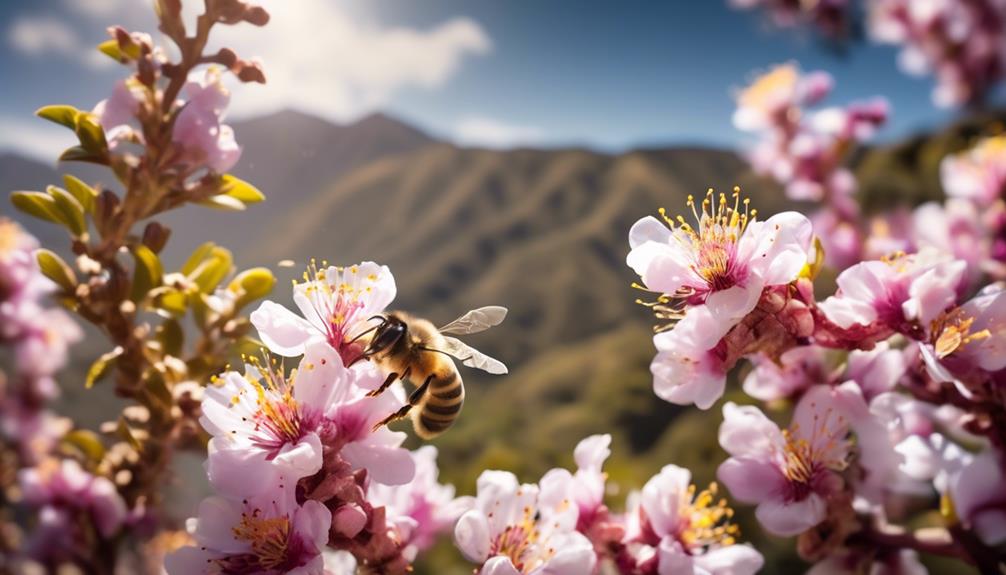
So, what exactly is Manuka honey, and why is it considered so unique in the world of bee products?
Manuka honey, native to New Zealand and Australia, is produced by bees that pollinate the flowers of the Manuka bush, also known as Leptospermum scoparium. Unlike regular honey, Manuka honey contains a compound called Methylglyoxal (MGO), which gives it unique antibacterial properties.
The strength of the antibacterial activity in Manuka honey is measured by the Unique Manuka Factor (UMF). The higher the UMF, the stronger the antibacterial properties. This potent antibacterial strength sets Manuka honey apart from other honeys, making it highly sought after for its health benefits.
Manuka honey is also rich in amino acids, vitamins, and minerals, contributing to its reputation as a superfood. It's been used for wound healing, soothing sore throats, preventing tooth decay, and improving digestive issues.
However, you need to be cautious while buying Manuka honey. Ensure it's labeled with a UMF rating, which guarantees its antibacterial potency and authenticity. So, next time you're shopping for honey, remember, not all honeys are created equal.
The Unique Manuka Factor
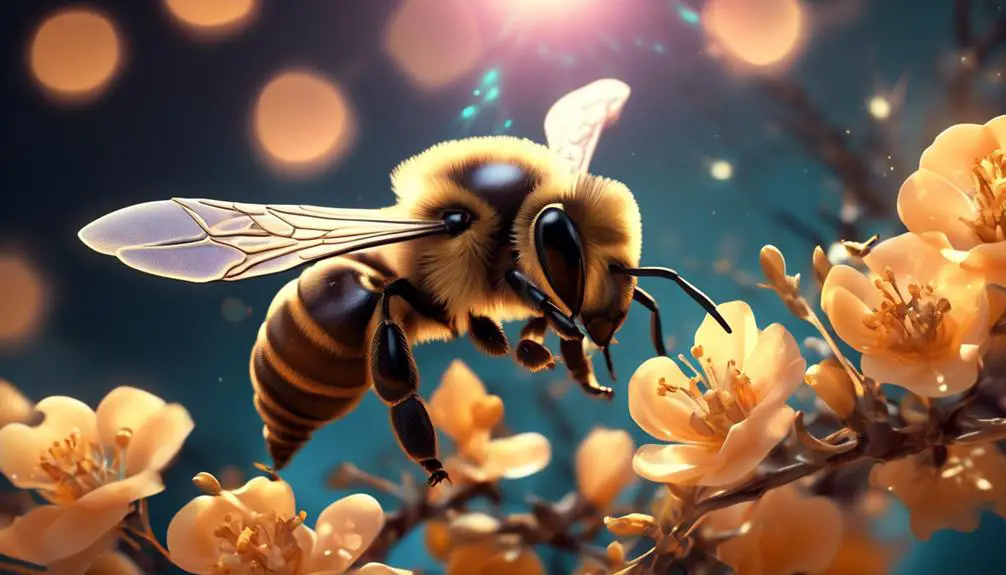
Digging deeper into the world of Manuka honey, you'll encounter the term 'Unique Manuka Factor,' a crucial aspect that significantly determines the honey's antibacterial power.
Unique Manuka Factor, or UMF, is a scale that measures the concentration of Methylglyoxal (MGO) and Dihydroxyacetone (DHA), two naturally occurring compounds in Manuka honey. UMF is directly proportional to these compounds' potency, making it a reliable indicator of the honey's therapeutic quality.
UMF ratings range from 5+ to 20+, with higher numbers indicating superior quality and effectiveness. A UMF of 10+ is considered beneficial, but for optimal antibacterial activity, a UMF of 15+ is recommended.
It's essential to note that not all Manuka honey carries the UMF trademark. For it to qualify, it must be independently tested and verified by the UMF Honey Association.
Understanding the UMF is vital when choosing Manuka honey. It's not just about the sweet taste, but also the therapeutic benefits it offers.
Bees Behind Manuka Production
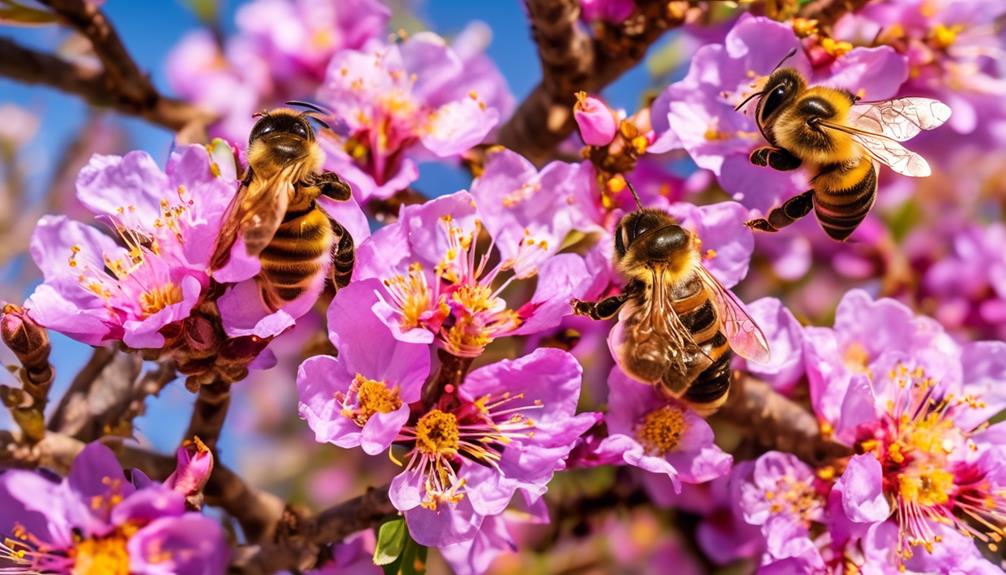
Often overlooked, it's the hardworking bees that are the real stars behind the production of the highly prized Manuka honey. In particular, it's the Apis mellifera, or European honey bee, that's tasked with this important job.
These bees collect nectar solely from the Leptospermum scoparium, or Manuka tree, native to New Zealand and southeast Australia. The Manuka tree's nectar contains a compound called dihydroxyacetone, which the bees convert into methylglyoxal (MGO) during the honey production process. It's this MGO that gives Manuka honey its unique antibacterial properties.
One bee can visit up to 2,000 flowers a day, tirelessly working to collect enough nectar. The bees store this nectar in their honey stomachs, where enzymes begin to break it down. Back at the hive, the nectar is regurgitated and evaporated, creating the distinctive Manuka honey.
Understanding the role of these bees is essential in appreciating the rarity and value of Manuka honey. The symbiotic relationship between the bees and the Manuka tree is a delicate balance, showcasing the beauty of nature's interconnectivity. Remember, next time you enjoy Manuka honey, it's the diligent work of these bees you're tasting.
Role of New Zealand's Environment
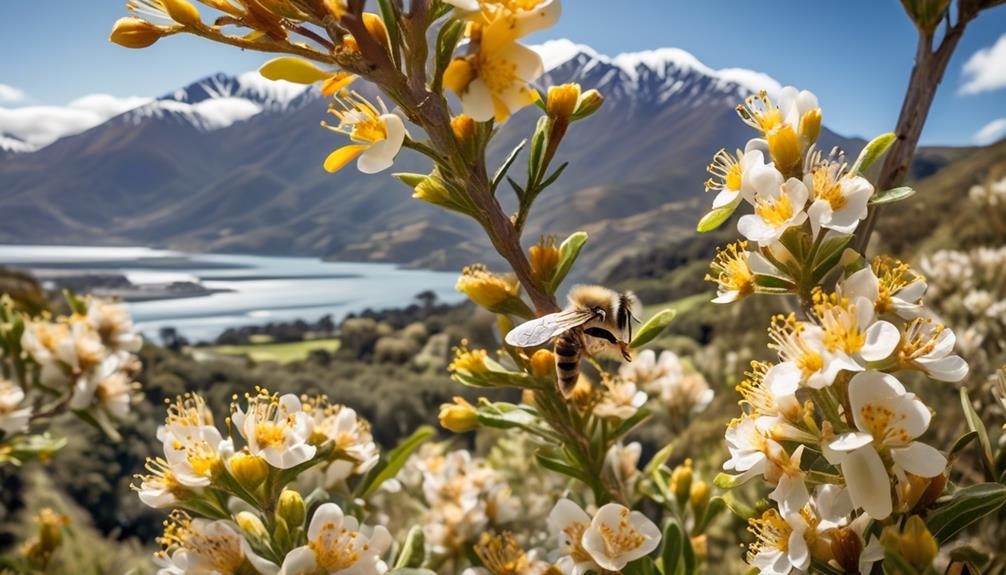
In understanding the production of Manuka honey, it's crucial to consider the unique environmental conditions of New Zealand that shape this intricate process. The country's isolation and diverse landscapes create a haven for the Manuka tree (Leptospermum scoparium), the sole source of nectar for Manuka honey production.
The Manuka tree thrives in New Zealand's acidic soils and rugged terrains, with a preference for damp, low-lying areas. Its ability to endure harsh conditions and poor soils makes it a resilient species. The flowering period of the Manuka tree, influenced by local climate variations, dictates the timing of honey production.
You'll find that New Zealand's temperate climate is key to the life cycle of the bees that produce Manuka honey. The country's wet winters and warm, dry summers provide optimal conditions for colony growth and honey production. The absence of heavy frosts allows bees to forage throughout the year.
New Zealand's strict biosecurity measures also play a vital role, preserving the health of its bee populations by limiting the introduction of foreign pests and diseases. Therefore, the unique environment of New Zealand is instrumental in the production of this highly prized honey.
Health Benefits of Manuka Honey
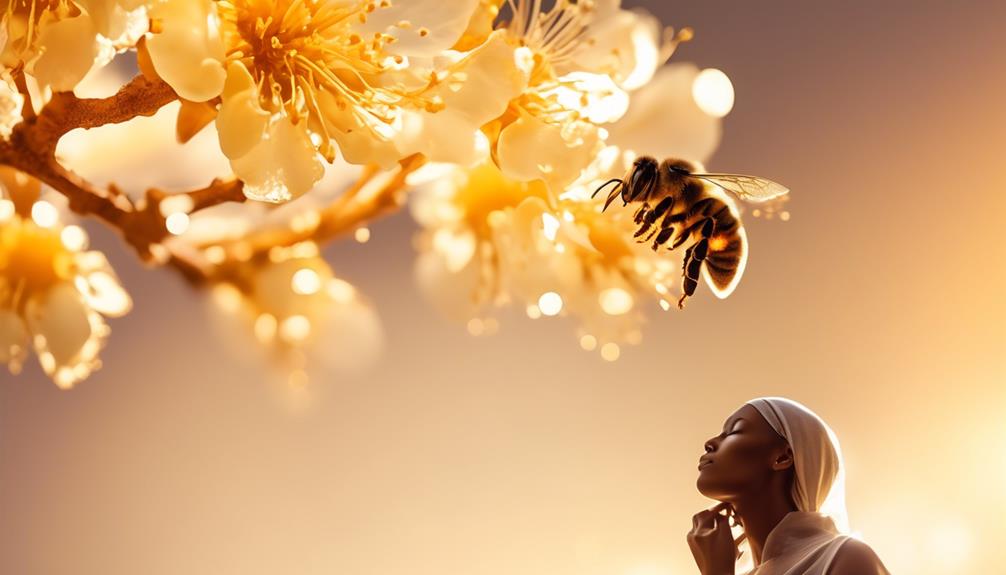
You'll be amazed to learn that Manuka honey, beyond its sweet decadence, offers a wealth of health benefits backed by scientific research. This honey, produced by bees that pollinate New Zealand's Manuka bush, is a potent elixir with unique properties you won't find in regular honey.
Manuka honey's primary benefit lies in its antimicrobial properties. It's packed with a compound called Methylglyoxal (MGO), which effectively fights off bacteria, making it a natural treatment for wounds and infections. The higher the MGO level, the stronger the antimicrobial effect.
Furthermore, Manuka honey is a powerful antioxidant. It works to neutralize harmful free radicals in your body, potentially reducing the risk of chronic diseases like heart disease and cancer.
Manuka honey also soothes a sore throat, thanks to its anti-inflammatory effects. It can even suppress a cough more effectively than over-the-counter medicines.
Lastly, it aids in digestion. It's known to alleviate symptoms of irritable bowel syndrome, including abdominal pain and irregular bowel movements.
Incorporating Manuka honey into your diet could significantly improve your health. Remember, though, it's not a magic cure-all. Always consult with your healthcare provider before trying new treatments.
Frequently Asked Questions
What Specific Species of Bees Produce Manuka Honey?"
You're asking about the specific bee species that produces Manuka honey. It's the Apis mellifera, commonly known as the European Honey Bee.
This bee is unique in its ability to collect nectar from the Manuka tree, native to New Zealand. The bee's interaction with the tree's flowers results in the production of honey with unique antibacterial properties.
This makes Manuka honey a highly coveted product worldwide.
What Are the Threats to the Bee Population That Produces Manuka Honey?"
You're asking about threats to the bee population responsible for manuka honey.
They're primarily facing habitat loss, pesticides, and diseases like American Foulbrood.
Additionally, climate change affects the bees' food sources, while invasive species compete for resources.
It's crucial to address these issues, as they're not only threatening the bees, but also the production of this unique honey with its renowned health benefits.
How Is the Process of Producing Manuka Honey Different From Other Types of Honey?"
You're interested in how manuka honey production differs from other honeys. Well, it's all about the nectar.
Manuka honey is made by bees that feed on the nectar of the manuka bush, native to New Zealand. This nectar contains a compound called methylglyoxal, not found in significant amounts in other honeys. It's this compound that gives manuka honey its unique antibacterial properties.
What Are the Potential Negative Effects of Consuming Manuka Honey?"
You're wondering about potential negatives of consuming Manuka honey.
While generally safe, it's not recommended for infants under 12 months due to potential botulism risk.
If you're allergic to bees, you might react to it.
Overconsumption can lead to weight gain, as it's high in sugar.
Diabetics should also monitor their intake due to the high sugar content.
It's not a magic cure-all, so don't overlook traditional medicine when needed.
Are There Any Ethical Considerations in the Production of Manuka Honey?"
Yes, there are ethical considerations in manuka honey production.
For example, you must ensure the bees aren't harmed or stressed during the extraction process.
Overharvesting can also harm the bees' health and the local ecosystem, so it's crucial to take only what's necessary.
Additionally, introducing non-native bees for production can disrupt the local biodiversity.
It's important to consider these factors for ethical and sustainable manuka honey production.
Conclusion
So, you see, it's the tireless New Zealand bees buzzing around the native Manuka bushes that produce the unique Manuka honey.
This isn't your average honey though! Due to the native environment and the Unique Manuka Factor, this honey has health benefits beyond belief.
So, next time you drizzle honey on your toast, consider reaching for Manuka honey – your body may thank you for it!


